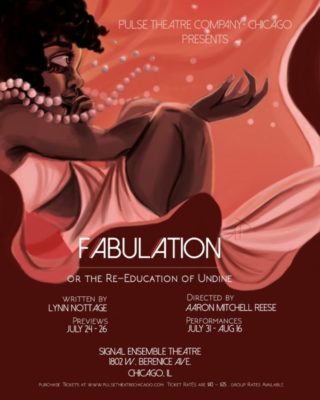Fabulation; or the Re-Education of Undine
Directed by Aaron Mitchell Reese
Produced by Pulse Theatre Company, Chicago
Playing at Signal Theatre
Life’s Grotesque Absurdities on Wry Display
Chicagoans recently had a chance to see how Lynn Nottage’s body of work has evolved over the years when Eclipse Theatre dedicated their last season to the Pulitzer Prize-winning playwright. If you missed it or are in the mood for more, the newly formed Pulse Theatre Company is presenting a fourth Nottage play, Fabulation; or, the Re-Education of Undine. Written in 2004, Fabulation has a more exaggerated, darkly humorous tone than Ruined or Mud, River, Stone. In the hands of Pulse’s artistic director Aaron Reese, it is an energetic story, with a sentimental heart underneath a predictable message, but a biting, satirical edge.
Undine Barnes Calles (AnJi White) is a publicist, what she calls “a bourgie negro,” who is used to her events being covered in Vanity Fair, and effortlessly mingles with her fellow Ivy League grads and rappers who have hit it big. It takes five words from her for us to see her massive self-importance and sense of superiority, as she berates someone on the phone for not getting an important celebrity to attend a fallopian-tube blockage awareness event (which also demonstrates Nottage’s sense of humor in this play). Undine, however, soon receives far worse news. Her Argentine husband Hervé (Jose T. Nateras) has divorced her unexpectedly, and disappeared with all her money. He had co-signed on everything, and within weeks, Undine is ruined, a social pariah, and moving back into public housing with her family, whom she led the world to believe had died in a fire.

Undine’s situation gets worse from there. She finds out that she is pregnant, and that her grandmother is addicted to heroin. After her grandmother asks her to make a purchase on her behalf, Undine is arrested, and subjected to the bureaucratic tyranny of the legal system, social services, and drug “treatment” programs. AnJi White played a similar character to Undine in Mud, River, Stone, and is an expert on how to be sharp, unapologetically self-motivated, and fiery in stressful situations. It’s hard not to admire Undine, especially during her direct address monologs, in which she is perceptive and takes witty swipes at the obnoxious people surrounding her. White’s performance not only makes Undine’s rise and clinging to power completely believable, but she’s just vulnerable enough for us to understand why love is Undine’s weak point which led to her downfall. What’s not believable is the central conceit of the script: that the humiliations and injustices of poverty would somehow come as a surprise to somebody who grew up in the projects. The play is called “re-education,” but Undine must have forgotten the entire first eighteen years of her life, and never been reminded of them until she was thirty-seven.

There are ten other actors, most of whom play multiple roles. Other than a love interest who shows up in the second act, these supporting characters are all played pretty broadly, although some are bigger caricatures than others. For example, Ian Deanes plays Undine’s brother Flow, an intellectual security guard whose pipe dream is that he will someday complete an epic poem on the black experience in America using Brer Rabbit as a metaphor, while Barry Irving plays both a reasonable, sensitive second love interest for Undine as well as an FBI agent who cartoonishly darts from hiding space to hiding space while wearing a terrible wig. These characters are fun once you realize what Nottage is going for, but there’s a little bit of mood whiplash when it’s unclear which ones are jokes and which ones are meant to be poignant.
Aaron Reese’s direction paces Undine’s arc well, and with a few goofy exceptions in the script like the above-mentioned FBI agent, generally keeps the humor muted, allowing it to speak for itself. The actors are mostly left to improvise their own business during crowd scenes, which help establish a sense of the world, though they occasionally go a little far. Jos N. Banks’s costume designs are another big aid in character development; one thing you can say for Undine is that she always looks good. Fabulation is overall a fun show about numerous dark topics, and since it seems to be only Pulse’s second production, it’s a pleasure to see such a new company coming along so well.
Recommended
Jacob Davis
[email protected]
Reviewed July 31, 2015
For more information, see Fabulation’s page on Theatre in Chicago.
Playing at Signal Theatre, 1802 W Berenice Ave, Chicago. Tickets are $10-25; to order. Playing Fridays at Saturdays at 7:30 pm, Sundays at 3:30 pm through August 16, and August 10 at 8:00 pm. Running time is one hour and forty minutes with one intermission.

